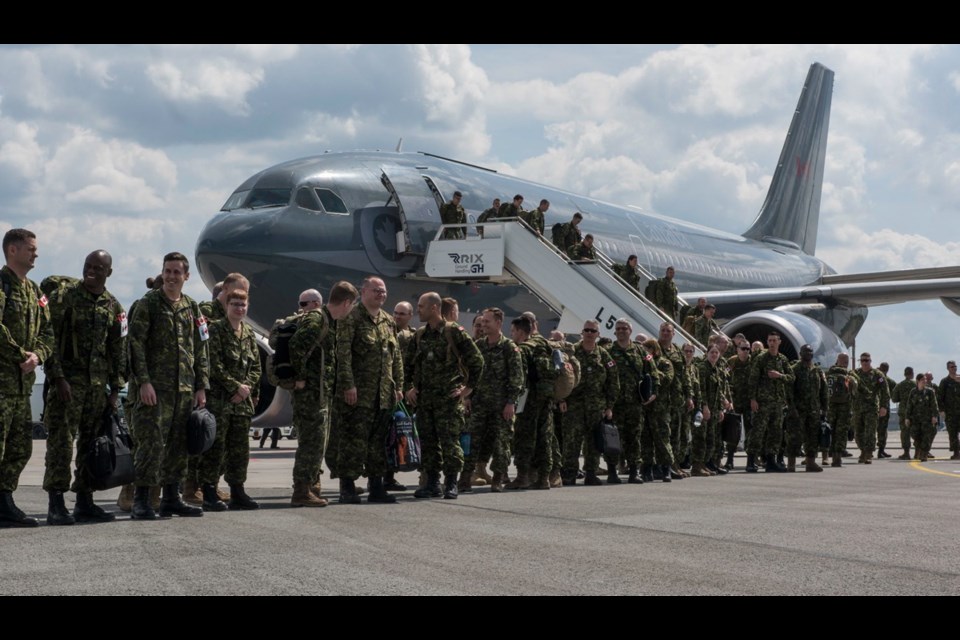When artillery Sgt. Jayden Cormier gets his morning coffee, the Victoria man, now on a mission in Latvia, stands in a United Nations mix of grinds and brews.
Spanish soldiers show up with a fine-ground coffee, the Italians with something dark and the Canadians with a coarse grind of Tim Hortons’ brand. And every country seems to have a different coffee-making device.
“Everyone comes out in the morning and seems to have their own little method of brewing their coffee,” said Cormier in a telephone interview from Latvia. “But everyone still seems to bond over that morning cup.”
The 28-year-old reservist from the Victoria-based 5th (British Columbia) Field Artillery Regiment is one of 450 Canadians leading a multinational battle group in Latvia. It’s a posting expected to last into 2018.
Most of the Canadians are mechanized infantry drawn from the Edmonton-based 1st Battalion, Princess Patricia’s Canadian Light Infantry and are part of a mission the Department of National Defence has called Operation Reassurance.
It’s part of a NATO effort to demonstrate a resolve to stand against any Russian incursions into neighbouring Baltic nations Latvia, Lithuania and Estonia, and Poland. It was a demonstration agreed at a NATO summit in 2016 in response to Russian interference in Ukraine and a 2008 incursion into Georgia.
saąúĽĘ´«Ă˝ leads one of four battle groups in the Baltic states and Poland. The U.K. leads in Estonia, Germany in Lithuania and the U.S. in Poland.
But saąúĽĘ´«Ă˝â€™s 1,200-strong battle group is the most culturally diverse, with troops from Spain, Italy, Poland, Slovenia and Albania. Only the German-led group comes close, and its members are all from or closely allied with the European Union: Belgium, Luxembourg, Netherlands and Norway.
For soldiers such as Cormier, officers and analysts, it’s saąúĽĘ´«Ă˝â€™s ability to accommodate various ethnic groups and languages that makes it one of the most valued and trusted in the world today.
“We are a multicultural nation, and I think that’s one of our strengths,” said Cormier. “We can bring that multiculturalism we have learned as Canadians to the table and strengthen NATO with that experience.
Christopher Kilford, a military analyst with the Queen’s University Centre for International and Defence Policy now living in Victoria, said despite any controversy about military spending, saąúĽĘ´«Ă˝ remains a bulwark welcomed all over the world.
Kilford noted Saudi Arabia and South Korea spend more on their armed forces. But neither country is ever asked to lead overseas missions.
Also, besides a reputation for honour and trustworthiness, saąúĽĘ´«Ă˝â€™s armed forces in particular have always been an expeditionary force.
Other nations will concentrate on missions closer to home; South Korea looks to match North Korea, for example. But saąúĽĘ´«Ă˝â€™s forces have long expected and been prepared to undertake or support missions overseas.
So Kilford said the Canadian Armed Forces are good at what he calls “exporting security,” a feat that usually comes with more than just arms. It can require analysts, diplomats and aid workers, often non-governmental.
“There are only a handful of countries that can go around the world and make a difference,” he said. “We are able to get people out and in the door just about anywhere, and we do it with a minimum of fuss.
“So when the world needs someone to take charge of a battle group, they will come to Ottawa.”
Kilford also said Operation Reassurance is something of a return to NATO’s traditional role of watchdog on the Russians.
It’s mostly about deterrence.
That saąúĽĘ´«Ă˝ leads a force made up of so many different nations adds to the deterrent value: any country that engages with the group risks offending six countries, as well as the NATO alliance.
Kilford speculated any move by Russia would be covert instead of a direct military invasion — economic embargoes, closed borders or clandestine gifts of weapons or explosives to sympathetic forces inside Latvia.
He noted even to be stationed in Latvia will require a level of cultural sensitivity from Canadians. Many Latvians speak Russian, some as their first language. And many might find the presence of NATO to be objectionable.
Gen. Jonathan Vance, chief of the Canadian defence staff, warned in February that troops should be on guard against any misinformation or propaganda. At the time of Vance’s warning, a false report had already been circulated in Lithuania contending four German soldiers had raped a teenage girl.
“There are a million ways the Russians could cause problems in Latvia without ever sending a single soldier across the border,” said Kilford.
Canadian Air Force Capt. Dan Mazurek, information officer for the battle group in Latvia, said in a phone call he is aware of the local ties to Russia.
“The other day, I got to see a movie and there was Latvian and Russian subtitles,” said Mazurek. “But I haven’t seen any animosity.”
“So far I’ve enjoyed what I can only describe as a warm welcome,” he said.
He said the battle group is training regularly and maintaining a high level of readiness.
But at the same time, in a spirit of multiculturalism, regular language classes are put on by volunteers from various national units within the battle group, even if English is NATO’s default language.
“It’s been a great feeling out here, right across the battle group,” said Mazurek.
And enlisted people such as Victoria’s Master Cpl. Kathryn Holmberg, a reservist with 39 Signal Regiment, who volunteered for Latvia, is doing what soldiers overseas always do: missing family, hers in Nanaimo.
“I’m having a good time over here,” said Holmberg, 27, in a telephone interview. “But I always miss my mom when I go away.”



